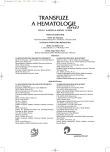-
Medical journals
- Career
Transmission of prion disease by blood and hot news in detection methods of abnormal prion protein
Authors: A. Broučková
Authors‘ workplace: Ústav imunologie a mikrobiologie, 1. LF UK, Praha
Published in: Transfuze Hematol. dnes,12, 2006, No. 1, p. 31-36.
Category: Comprehensive Reports, Original Papers, Case Reports
Overview
Prion diseases, so called transmissible spongiform encephalopathies (TSE), are neurodegenerative diseases, which affect both human and animals. Around 85% of human prion diseases is sporadic, 10–15% is inherited and 2–3% is acquired. The most frequent one is sporadic Creutzfeldt-Jakob disease (sCJD). As yet there is no treatment available, moreover we are not able to rapidly detect prion protein ante mortem. In England two cases of variant Creutzfeldt-Jakob disease (vCJD) transmitted by blood have been reported recently. vCJD rises due to exposure to bovine spongiform encephalopathy (BSE) contaminated food. There has been no case of vCJD in Czech Republic yet, however, despite preventive measures 20 cases of BSE have been already detected. Therefore, we can not exclude incidence of vCJD in Czech Republic. Such a case is a threat for transfusion medicine, as there is no available screening test. This article is dedicated to vCJD and transmission of this disease by blood. Hot topics from diagnostic field are presented at the end.
Key words:
prion protein, PrPsc, Creutzfeldt-Jakob disease, CJD, preclinical detection
Labels
Haematology Internal medicine Clinical oncology
Article was published inTransfusion and Haematology Today

2006 Issue 1-
All articles in this issue
- Real cost of chronic myeloid leukemia treatment with nonmyeloablative hematopoietic stem cell transplantation and comparison with cost of hypothetical imatinib treatment. What shall be considered in the cases of extremely costly medical procedures?
- The use of alemtuzumab in allogeneic stem cell transplantation
- Immunophenotyping of childhood leukaemias
- Optimalization of extracellular fetal DNA isolation for non-invasive fetal SRY, RHD and RHCE genotyping from maternal peripheral blood
- Transmission of prion disease by blood and hot news in detection methods of abnormal prion protein
- Plasmatic concentration of soluble endoglin in patients with lymphoid malignancies
- Transfusion and Haematology Today
- Journal archive
- Current issue
- Online only
- About the journal
Most read in this issue- Real cost of chronic myeloid leukemia treatment with nonmyeloablative hematopoietic stem cell transplantation and comparison with cost of hypothetical imatinib treatment. What shall be considered in the cases of extremely costly medical procedures?
- Transmission of prion disease by blood and hot news in detection methods of abnormal prion protein
- Immunophenotyping of childhood leukaemias
- The use of alemtuzumab in allogeneic stem cell transplantation
Login#ADS_BOTTOM_SCRIPTS#Forgotten passwordEnter the email address that you registered with. We will send you instructions on how to set a new password.
- Career

